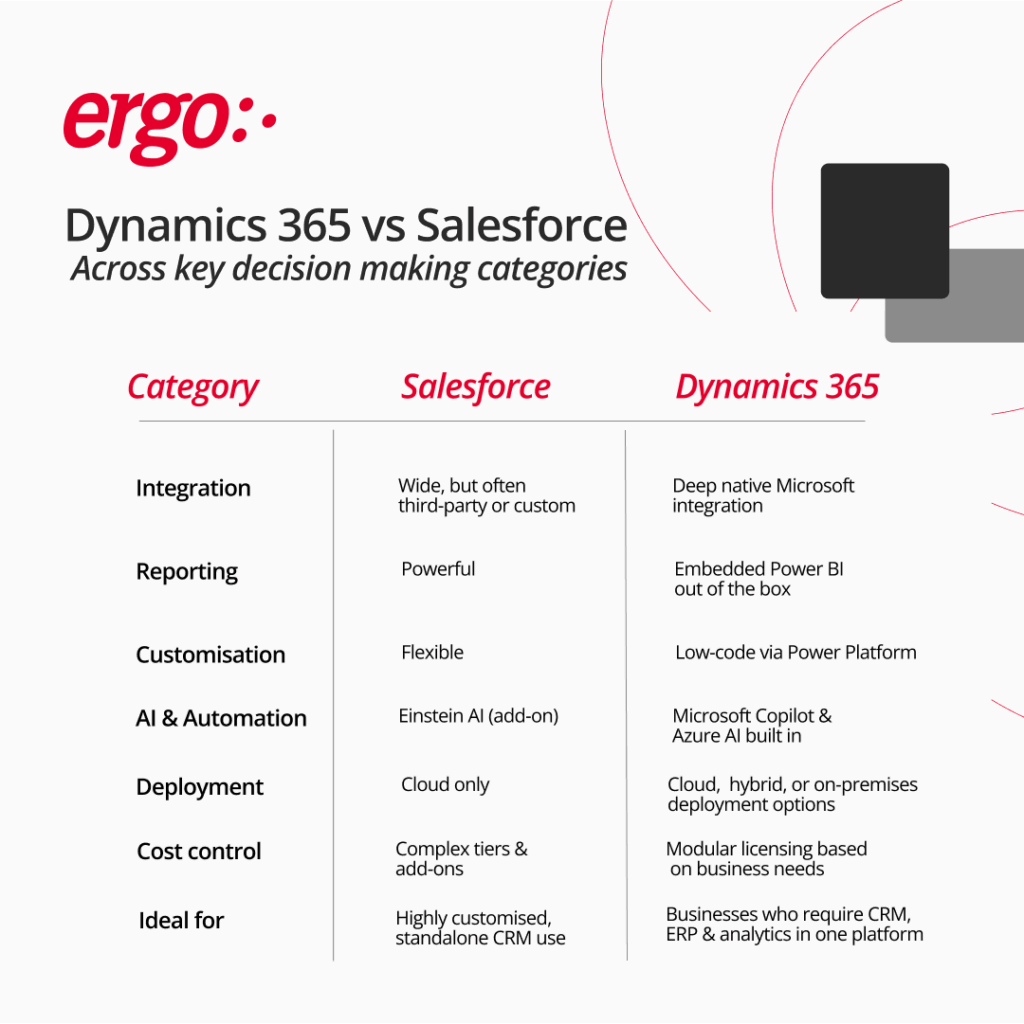Businesses today are under more pressure than ever to build connected, future-proofed & end user focused platforms. But choosing the right platform to manage key business processes such sales, service & customer relationships isn’t always straightforward.
In the search for the right CRM, two names dominate the conversation: Salesforce & Microsoft Dynamics 365. Both offer a comprehensive set of tools to manage customer relationships, drive sales & automate marketing process. However, choosing the right platform isn’t just about features, it’s about how well the solution fits your business needs, integrates with your core systems & supports long-term organisational vision.
Whether you’re a fast-growing scale-up or a well-established enterprise, the decision between Salesforce & Dynamics 365 should come down to more than brand familiarity. It should be based on suitability, flexibility & alignment with your broader technology strategy.
Salesforce: Powerful but Complex
The core Salesforce platform is rich with functionality, highly customisable & supported by a vast ecosystem of third-party apps via AppExchange.
But that power comes with trade-offs:
- It’s highly configurable but often requires specialist admin or development support.
- Integrations with other tools, including Microsoft 365, can require third-party apps or custom middleware.
- Reporting & automation are strong, although they can be complex to set up & maintain.
- As organisations scale, the costs of licences, integrations & add-ons can rise quickly.
For companies with deep in-house Salesforce expertise or a complex, multivendor tech stack, it remains a strong option. That said, for organisations already invested in Microsoft technologies, Dynamics 365 may offer a more naturally integrated & cost-effective alternative.
Dynamics 365: Built for business, designed for integration
Microsoft Dynamics 365 offers a modular suite of business applications that combine CRM & ERP in one unified platform. From sales & marketing to customer service, finance & operations, Dynamics 365 is designed to grow with your business. It adapts as your business needs evolve & your system requirements expand.
What makes Dynamics 365 especially compelling?
- Native integration with Microsoft 365, Teams, Outlook, SharePoint & Azure.
- Built-in reporting via Power BI for real-time dashboards & analytics.
- Customisation without complexity through Power Apps & Power Automate.
- A single source of truth across business functions, thanks to the Common Data Model (Dataverse).
- Flexible deployment options & licensing that scale with your business.
Even for organisations not currently using Microsoft 365, Dynamics 365 provides a strong foundation. Its modular structure means you can start with sales or customer service for example & then expand with additional modules as needed.
For Microsoft users, it’s a natural fit
If your business already uses Microsoft 365, Teams, or Power Platform, the case for Dynamics 365 becomes even stronger:
- Seamless calendar, email & document integration.
- Collaborative workflows between sales, service & back-office teams.
- Native Power BI dashboards embedded into Dynamics 365.
- Centralised security, governance & identity management platform-wide.
Instead of adding more tools to your stack, Dynamics 365 builds key tools that your team already use daily.
Choosing the right platform for long-term value
Here’s how Salesforce & Dynamics 365 compare across key decision-making categories:
Licensing & cost considerations
Both Microsoft Dynamics 365 & Salesforce offer modular licensing that allows businesses to select only the tools they need. Salesforce is typically centred around its Sales & Service Clouds, with optional add-ons like Marketing Cloud & Pardot priced separately. While this approach offers flexibility, it can become cost-intensive as functionality expands.
Microsoft Dynamics 365 takes a broader platform approach. Customers can start with individual apps like Dynamics 365 Sales & later bundle them into wider Customer Engagement or Unified Operations plans. For organisations already using Microsoft 365, Power Platform, or Azure, Dynamics 365 often delivers added value through native integration & shared licensing models.
While pricing will ultimately depend on your specific configuration, team size & business requirements, Microsoft’s integrated ecosystem can help reduce overhead & simplify deployment, especially for businesses looking to scale.
Conclusion: A smarter, more integrated CRM strategy
If you’re evaluating CRM options, Salesforce remains a strong contender. However, it often requires more time, budget & configuration to fully realise its potential.
Microsoft Dynamics 365 offers a more integrated, scalable alternative. It brings CRM, ERP, analytics & productivity tools into a single environment. Whether you’re starting small or scaling to enterprise-wide transformation, Dynamics 365 helps you move faster, collaborate more effectively & stay in control of your customer data.
Want to see how Dynamics 365 could fit into your business?
Talk to Ergo’s Digital team today!
Contact us







